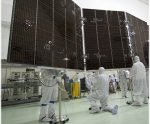Solar power will once again help expand humanity’s knowledge of the planets when NASA’s orbital satellite, Juno, is launched on its five-year journey to Jupiter in August.
Technicians in Florida have run final pre-flight tests on the spacecraft’s three massive solar panels, extending and exposing the photovoltaic cells to sunlight for the final time before they unfurl in deep space.
Juno’s mission will be to orbit Jupiter’s poles 30 times, mapping the intense magnetic fields of the gas giant, measuring water and other liquid levels and investigating the mysterious solid core of the planet. It is hoped that the data collected will provide critical knowledge for understanding the planetary systems being discovered around other stars.
NASA says it will be the first time in history a spacecraft has relied on solar power so far out in space. Jupiter is five times further from the sun that Earth, and receives 25 times less sunlight. At that distance, Juno’s enormous solar panels, measuring 2.7 metres wide by 8.9 metres long, will only generate about 450 watts of electricity, compared to the 12-14 kilowatts they would on Earth.
The successful completion of testing on Juno – in Greek mythology, Juno was the wife of Jupiter and the daughter of Saturn – has been met with relief at NASA headquarters.
"Completing the testing and stow of solar panels is always a big pre-launch milestone, and with Juno, you could say really big because our panels are really big,” said Jan Chodas, Juno’s project manager from NASA’s Jet Propulsion Laboratory. “The next time these three massive solar arrays are extended to their full length, Juno will be climbing away from the Earth at about seven miles per second."
NASA Juno Mission Page












































